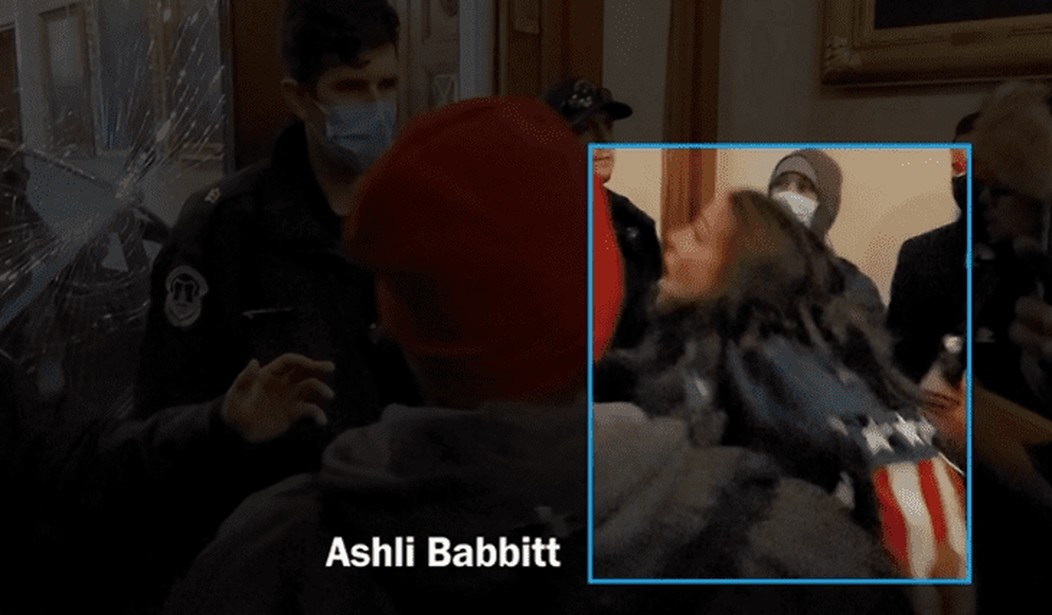Judicial Watch Files FOIA Suit Against FBI, Claims 'Cover-Up' in Jan. 6 Shooting Death of Ashli Babbitt
As I reported on January 6 of this year, Aaron Babbitt, the husband of deceased Jan. 6 protester Ashli Babbitt, filed a wrongful death lawsuit against the federal government. Attorneys with the conservative legal group Judicial Watch filed the suit — which alleges wrongful death, and assault and battery — on behalf of Mr. Babbitt.
And on Friday, Judicial Watch announced that it filed a Freedom of Information Act (FOIA) lawsuit on behalf of Mr. Babbitt and Ashli Babbitt’s estate against the Department of Justice (DOJ) for all FBI files related to the shooting death inside the U.S. Capitol by then-Capitol Police Lt. Michael Byrd.
Here's more:
The lawsuit was filed in the U.S. District Court for the Southern District of California to compel production of the FBI files on Ashli Babbitt and Aaron Babbitt after the FBI denied two February 27, 2023, FOIA requests to the FBI and subsequently failed to respond to an appeal of the denial for:
All FBI files for Ashli Elizabeth Babbitt. Additional information: “Subject also used the names” Ashli Elizabeth McEntee and Ashli Elizabeth Pamatian;” and:
All FBI records, including main and cross-referenced files, related to Aaron Raymond Babbitt.
Judicial Watch further said:
Ashli traveled alone from San Diego to Washington, D.C. to attend the Women for America First (aka Save America) rally on January 6, 2021, at the Ellipse. The shooting occurred at the east entrance to the Speaker’s Lobby.
After demonstrators filled the hallway outside the lobby, two individuals in the crowded, tightly packed hallway struck and dislodged the glass panels in the lobby doors and the right door sidelight. Lt. Byrd, who is a US Capitol Police commander and was the incident commander for the House on January 6, 2021, shot Ashli on sight as she raised herself up into the opening of the right door sidelight.
Lt. Byrd later confessed that he shot Ashli before seeing her hands or assessing her intentions or even identifying her as female. Ashli was unarmed. Her hands were up in the air, empty, and in plain view of Lt. Byrd and other officers in the lobby.
Judicial Watch charged that not only has the FBI refused its demand for files related to the case but also that the agency has "stiff-armed" the DOJ office that advocates for FOIA compliance. The legal group said in its four-page filing:
The FBI has failed to produce the requested records, demonstrate that the requested records are lawfully exempt from production, or notify plaintiffs of the scope of any responsive records they intend to produce or withhold and the reasons for any withholdings.
Judicial Watch President Tom Fitton said:
Ashli Babbit was the only homicide victim on Jan. 6, yet the FBI has been illicitly hiding its files on Ashli Babbitt from her family for a year. Why the cover-up?
Was there a cover-up? I can't answer the question but I can provide details of Ashli Babbitt's final moments, per the Judicial Watch filing.
Ashli remained conscious for minutes or longer after being shot by Lt. Byrd. Ashli experienced extreme pain, suffering, mental anguish, and intense fear before slipping into pre-terminal unconsciousness. The autopsy report identified the cause of death as a ‘gunshot wound to left anterior shoulder’ with an onset interval of ‘minutes.’ The fact that Ashli was alive and conscious in extreme pain and suffering is documented in videos of the shooting.
Furthermore, nothing about the wound track described in the autopsy report would be expected to result in immediate death or instantaneous loss of consciousness, and Ashli’s lungs contained blood, further confirming that she was alive and breathing after being shot. Ashli was pronounced dead at Washington Hospital Center at 3:15 p.m. The medical examiner determined that the manner of death was homicide.
The Department of Justice closed its case on the shooting death of Ashli Babbitt on April 21, 2021, announcing that it would not pursue charges against then-Lt. Byrd. for Babbitt's death.
Was the decision just — or was it a travesty of justice?





Post a Comment